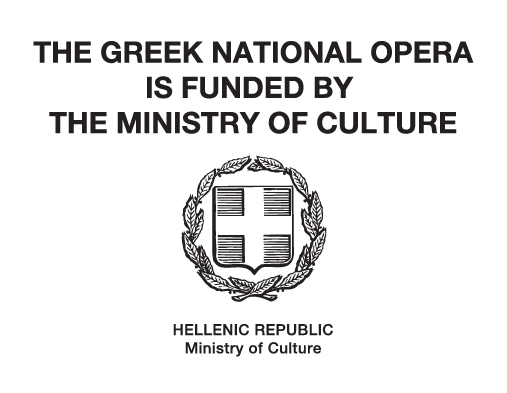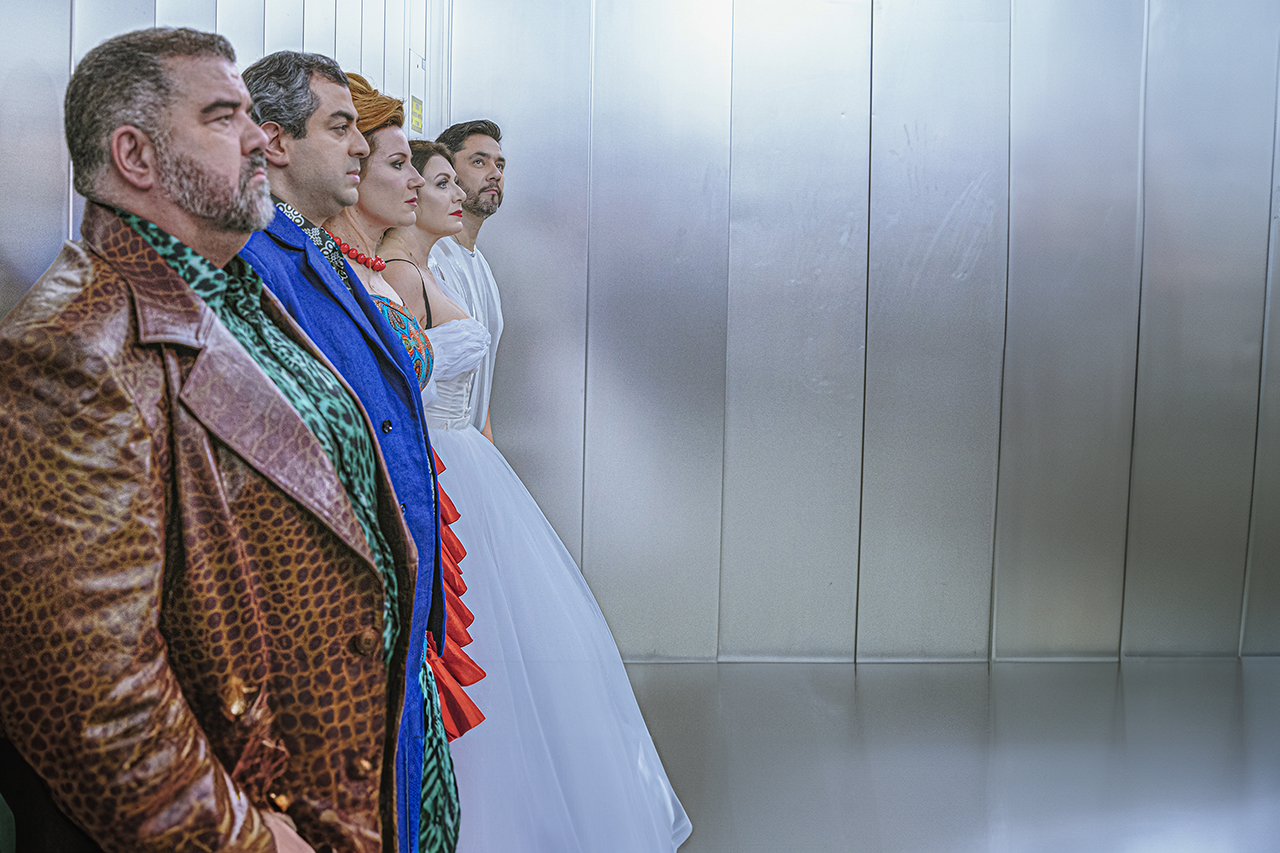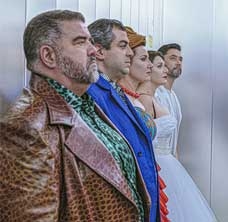
GNO lead donor
![]()
Production sponsor

The Greek National Opera opens 2024 with a new ambitious production of the most famous double bill of opera. Mascagni's Cavalleria rusticana and Leoncavallo's Pagliacci take the stage of the Stavros Niarchos Hall at the SNFCC, from 25 January and for a run of six performances, conducted by Antonello Allemandi and directed by Nikos Karathanos. The production is made possible by a grant from the Stavros Niarchos Foundation (SNF) [www.SNF.org] to enhance the Greek National Opera's artistic outreach.
Cavalleria rusticana («Rustic Chivalry») and Pagliacci, these two top works of the movement that went down in history as «verismo» (from the Italian word vero which means true) and which expresses realism in Italian opera, constitute to this date the most popular double bill in the history of opera.
Cavalleria rusticana won the 1890 competition for one-act operas run by the Italian music publisher Edoardo Sonzogno, who was seeking fresh talent in among a new generation of Italian composers. Two years later, Pagliacci -an opera in two acts with a prologue- was presented in Milan, conducted by Arturo Toscanini, to instant success. The aria «Vesti la giubba» («Put on the costume» that includes the phrase «ridi, pagliaccio» - «laugh, clown») found global fame thanks to the legendary Italian tenor Enrico Caruso and, to this very day, remains synonymous with opera itself as an art form. Taking a distance from the fervour and high-flown ideals of Romantic operas, these two short operas recount the passions of common, ordinary people living in southern Italy. The passionate intensity of their music -which only heightens the drama and deepens the emotion- has also bestowed timeless longevity upon these operas, which have endured as core works of repertoire at opera houses across the world since their premiere.
Nikos Karathanos, a highly esteemed director in Greek theatre, was selected by the Greek National Opera to direct the new production of Cavalleria rusticana and Pagliacci. With this production Karathanos makes his debut in repertoire opera and attempts to offer a new reading of these two prominent verismo works through his distinct poetic and at once realistic style. As he notes: «Never has so much blood drawn so much applause. Never has such a crime borne such music - the legendary Caruso could not escape this music, but then nor could Coppola and his Godfather, or Scorsese, or the Mafia itself... Indeed, none of us could escape it! Slipping as it did into our kitchens to liven and elate our afternoons, tailing us in the evenings -back when we were young, leaving the house freshly-bathed, scrubbed clean, our hair parted down the middle- and begriming us all night long. No mother, no lover ever managed to resist singing -under their breath or, better yet, at the top of their voices- those arias heard in Cavalleria rusticana and Pagliacci, as they cooked, as they flirted ferociously. No-one -be they poor, tall or stout, deep, shallow or rich- could ever resist the idea that they, in fact, are the ones singing 'Vesti la giubba'. In such moments, an audience is not simply watching a performance. No - our very youth bleeds.»
The production features sets and costumes by the acclaimed British designer Leslie Travers, who impressed audiences with his scenography for the GNO's recent production of Bluebeard's Castle. The fruit of the collaboration between Karathanos and Travers is an impressive stage world full of Easter spring light, as well as colourful costumes reflecting the madness of life and the poetic dimension of dreaming. The musical dramaturgy is by Angelos Triantafyllou, the choreography by Amalia Bennett and the lighting by Ben Pickersgill.
The production will be conducted by the internationally renowned Italian conductor Antonello Allemandi in his first collaboration with the Greek National Opera. Since his debut at the age of just 21 and to this date he has successfully conducted in leading opera houses, such as, the New York Metropolitan Opera, the Royal Opera House, London, the Vienna State Opera, the Berlin State Opera, the Paris Opera, La Scala, Milan, Teatro Real in Madrid, etc. From 1992 to 1997 he has served as musical director of Orchestre Colonne in Paris, one of the oldest symphony orchestras in France.
The audience will have the chance to enjoy world-class opera singers.
The renowned Greek baritone Dimitri Platanias will perform as Alfio in Cavalleria and as Tonio in Pagliacci, two roles he has performed to huge success and for which he has received raving reviews, not only at the Greek National Opera but also at the Royal Opera House, the Salzburg Festival, La Monnaie in Brussels and the San Francisco Opera.
In his first collaboration with the Greek National Opera the acclaimed tenor Arsen Soghomonyan will make his debut in the role of Turiddu in Cavalleria, and will also perform as Canio in Pagliacci. Following his huge success as Otello, under the baton of Zubin Mehta in Berlin, Soghomonyan is regarded as one of the most sought-after dramatic tenors in the world and has performed in leading opera houses, including the Teatro di San Carlo in Naples, the Bayerische Staatsoper in Munich, the Mariinsky Theatre in Russia, as well as at the Baden-Baden and Aix-en-Provence Festivals.
Ekaterina Gubanova, one of the greatest mezzo-sopranos of her generation, will finally make her highly anticipated debut as Santuzza in Cavalleria, following her last performance at the GNO in Don Carlo back in 2019. Gubanova has performed at the world's most prestigious opera houses (London, Milan, Munich, Vienna, Madrid, New York, etc), she has recorded Wagner's tetralogy with Valery Gergiev for the Mariinsky Theatre, and is considered as one of the top performers internationally of the role of Brangaine in Tristan und Isolde.
Cellia Costea, a distinguished soprano of the GNO, will be taking on the role of Nedda in Pagliacci, a role she has sung to great success at the Odeon of Herodes Atticus, the Theatre of San Carlo in Naples, and the Teatro Lirico di Cagliari in Sardinia.
Acclaimed baritone of the GNO Dionysios Sourbis will perform as Silvio in Pagliacci, a role he has performed to great success at the Royal Opera House in London, the Opera of Rome, and the Greek National Opera.
Alongside them distinguished and younger Greek soloists, such as Julia Souglakou, Diamanti Kritsotaki, Yannis Kalyvas and more.
The GNO Chorus will be conducted by chorus master Agathangelos Georgakatos and the GNO Children's Chorus by Konstantina Pitsiakou.
CAVALLERIA RUSTICANA - Synopsis
Easter dawns in a Sicilian village. Turiddu is heard in the distance singing about Lola, the wife of the prosperous carter Alfio. Townsfolk and fieldworkers mingle in the piazza and then disperse. Looking for Turiddu, Santuzza approaches Lucia, his mother, in their tavern. The old woman says to Alfio that Turiddu is away, buying wine. Alfio boasts of his horses and of his new wife, Lola. The villagers follow a procession to mass. Santuzza stays behind, as she is excommunicated for her affair with Turiddu. She tells Lucia that Turiddu has abandoned her for his old flame, Lola. The old woman leaves for mass. When Turiddu arrives, Santuzza confronts him. Lola saunters in, infuriating Santuzza with her arrogance. When she enters the church Santuzza resumes her pleading, but Turiddu refuses to listen. When, finally, he pushes her to the ground, she curses him. Alfio arrives and Santuzza reveals that his wife has been cheating on him. Alfio swears to take revenge.
The villagers join Turiddu in a drinking song, but the atmosphere becomes tense when Alfio appears, insulting Turiddu and challenging him to a knife fight. Turiddu admits his guilt but will go through with the fight, for Santuzza's sake as well as for honour. Alone with his mother, Turiddu begs her to take care of Santuzza if he doesn't come back. As Lucia waits anxiously in the piazza, shouts are heard in the distance. A woman runs in screaming that Turiddu has been killed.
PAGLIACCI - Synopsis
PROLOGUE
Tonio, a member of a touring theatre troupe, informs the audience that the work they are about to watch is based on real-life events.
ACT I
Mid-August in a village in Calabria. The villagers have flooded the streets to welcome the actors of a touring theatre troupe. Canio, the head of the troupe, invites them to their evening performance. A random comment expressing admiration towards the beautiful Nedda, Canio's wife, sparks a negative reaction from him. Nedda fears that Canio is suspecting her of infidelity. The beautiful girl is jealous of the birds that fly freely in the sky wherever and whenever they like. She is approached by hunchback Tonio, another member of the troupe, who awkwardly tries to flirt with her. She violently pushes him away, triggering within him a desire for revenge.
In comes Silvio, to whom Nedda has entrusted her dreams for a better life. They decide to meet later that night. Tonio eavesdrops on their conversation and informs Canio about it. Canio returns right on time and attacks his wife. He hears Nedda's last words to her lover but fails to catch a glimpse of his face. Nedda is saved at the last moment thanks to the intervention of Beppe, another actor. Canio demands to know her lover's name.
ACT II
People are gathering for the performance. On the stage, Arlecchino / Beppe is singing to his beloved Colombina / Nedda. Brimming with irony, Taddeo / Tonio also expresses his love for Colombina who is «as white as snow». After sending him away, Arlecchino returns to have lunch with his sweetheart. They are interrupted once again by Taddeo, who comes in to announce the arrival of Pagliaccio / Canio, Colombina's husband. Arlecchino runs away through the window, yet Canio is able to catch Colombina's last words to him: they are just like the words Nedda had said to her actual lover, Silvio, a while earlier. Canio can hardly restrain himself and attacks Nedda. Wanting to prevent any harm from occurring, she continues performing the role of Colombina and persistently refuses to reveal the name of her stage lover, Arlecchino. Her refusal is making Canio even angrier, as he believes that his wife is publicly mocking him. Things get out of hand. The spectators realise that what they are witnessing is not just a performance, but an actual confrontation in real life. Nedda insists on her refusal and Canio kills her. Silvio rushes onto the stage through the audience in an attempt to save her, but doesn't arrive in time. When he finally reaches the stage, he also gets stubbed by Canio. Addressing the public, Tonio drops the curtain and announces that the performance (comedy) has finished.














